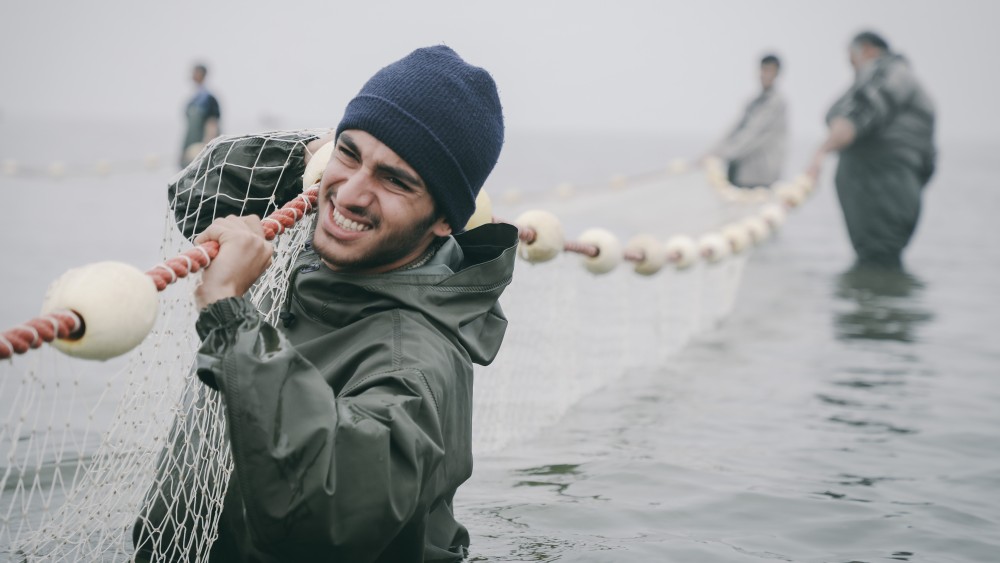
Behrooz Karamizade’s Iranian drama “Empty Nets,” which has its international premiere in the Crystal Globe Competition at the Karlovy Vary Film Festival, offers a sobering look at the increasingly difficult, sometimes hopeless lives of young working-class people in Iran as they strive for better lives.
Set on Iran’s northern Caspian Sea coast, the film follows Amir (Hamid Reza Abbasi), a young man who, desperate to marry his girlfriend Narges (Sadif Asgari), seeks work at a local fishery with the hope of earning enough money for an appropriate dowry and winning over her upper-class parents. Once there, illicit opportunities present themselves and he is soon drawn into the dangerous but lucrative business of sturgeon poaching and the black market caviar trade.
The Iranian-German director, who grew up in Germany, says he always wanted to shoot his first feature film in Iran. “I’m very impressed by Iranian cinema and I grew up with Iranian cinema. I thought my cinematic roots are in Iran and I have to go there and shoot my first film there.”
While his family is from southern Iran, Karamizade traveled to the northern region of the country, finding inspiration on the Caspian coast. “I am very connected to the sea; I am a very sea-addicted person. I love the sea and I love the different faces of the sea. I was always interested in fishermen, this very strong masculinity and very hierarchic, arcane people. One of my favorite stories was that of Captain Nemo – ‘Twenty Thousand Leagues Under the Sea.’ I love these stories.”
Before making the film, Karamizade spent time with fishermen in the area while working on a photographic essay. It was then that he learned about the poaching.
In wanting to explore Iranian society, the filmmaker developed an allegorical tale set in the fishing community.
Behrooz Karamizade
Credit: Laura Nickel
“Our society is very male-dominated, which leaves very little place for other persons, other genders, to breath and develop themselves,” he notes.
The idea came to him to bring a young, innocent, naive, romantic person, still unspoiled by the hardships of life, into this world dominated by men and ruled by power – a role perfectly embodied by Abbasi. The fishery itself is a parable of a dictatorship, Karamizade adds.
In addition to underscoring the growing rift between the wealthy and working-class people of Iran and the economic hardship exacerbated by U.S. sanctions that hurt the poor much more than the elites, the film also examines the alarming environmental harm to marine ecosystems caused by trash, plastic waste and illicit fishing in the waters of the Caspian Sea.
As the once pristine nature is increasingly destroyed, so too is young Amir corrupted by the wrong decisions that he makes while working with the opportunistic and greedy men who manage the fishery, Karamizade points out.
There is a large elite in Tehran that enjoys a very good life but unfortunately the gap is getting bigger and bigger and many people are suffering, Karamizade says. “That’s also why I made the film. I wanted to understand the fishermen and also the poachers and why they are doing it. … But I also wanted to criticize them and I wanted to show that sometimes when you push people to the edge, they can do a lot of things that are not good for them and not good for the world. But we cannot judge them. We have to follow and see what was the route to this edge. I wanted to follow this – why Amir goes to the edge and what was his path to get to the edge.”

“Empty Nets”
Credit: Hamid Janipour
Karamizade also highlight the plight of Iran’s young people, who are suffering the most from the country’s economic situation. Lack of employment and good wages, for example, gravely limit the prospects for marriage, children and prosperity. The multitude of problems they face – economic difficulties, tradition, debt – keep them trapped in a seemingly hopeless situation as they stack up layer upon layer, he explains.
“All these young people are like fish in a net, gasping for air but they’re not getting air. … They are really suffering a lot.”
At the same time, he also wanted to present another image of Iran, of young people with a great deal of hope despite the dire situation, “to show the world these beautiful young faces.”
Karamizade shot “Empty Nets” on location in the northern Iranian coastal cities of Rasht and Bandar Anzali – a region whose damp climate and overcast skies evoked a melancholic and oppressive atmosphere the director and cinematographer Ashkan Ashkani (“There Is No Evil”) found ideal for the film.
Commenting on his own visual style, the importance of imagery and his use of locations, Karamizade said he was inspired by his mentor, Thomas Mauch, the DOP who collaborated with Werner Herzog on many of the director’s films, including “Aguirre, the Wrath of God” and “Fitzcarraldo.”
Karamizade currently has a German project in early development, a historical film set during World War II that he’s writing with Heide Schwochow (“The German Lesson”).
Based in Kassel and Berlin, Karamizade is one of four founders of Living Pictures Production, which co-produced the film with Basis Berlin Filmproduktion, Rainy Pictures, ZDF/Kleines Fernsehspiel and Arte. Port au Prince Pictures will release “Empty Nets” in Germany on Jan. 18.
Pluto Film is selling “Empty Nets” internationally. The company, which was taken over last year by Benjamin and Daniela Cölle, says the new acquisition perfectly represents its focus “on engaging global cinema through identifying emerging talents.”














